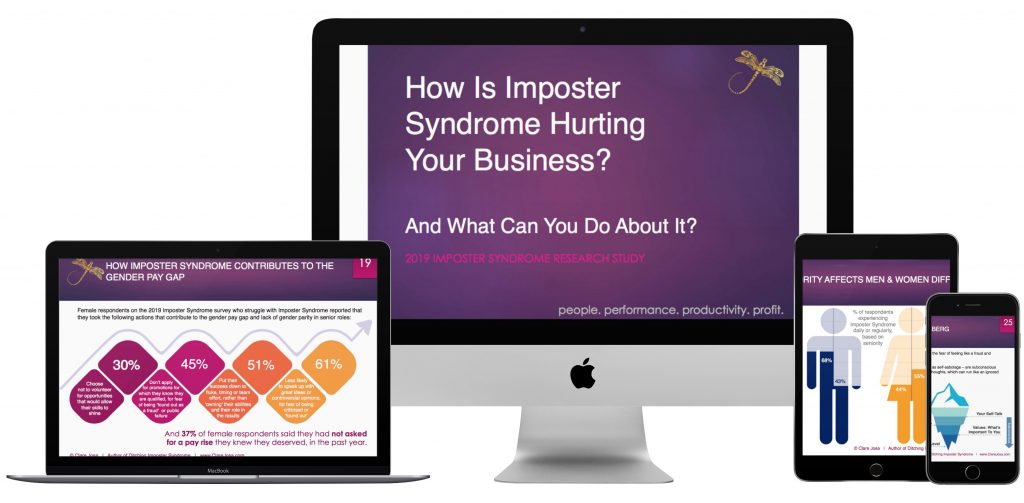
Download Your Copy Of The White Paper For The
2019 Imposter Syndrome Research Study
This landmark research study is the first of its kind in the UK. It shows how widespread Imposter Syndrome is and how it is potentially costing UK businesses billions.
Register free, below, to download your copy of the research white paper.
Spam-free zone.
You will only be sent the White Paper and other occasional news about topics related to the research study, unless you have also asked for my newsletter.
As Seen In:

Want Clare To Take Your Team Through The Research?
Scroll down to arrange a call and discuss your needs. Clare Josa can:
Press Release: 2019 Imposter Syndrome Research Study
Landmark Research Study Shows Imposter Syndrome Is Costing British Businesses Billions
A landmark UK-based research study has found that 52% of female respondents and 49% of male respondents are struggling with Imposter Syndrome 'daily' or 'regularly', negatively affecting their performance, their productivity, team working relationships, their mental health, and their employer's profit.
Imposter Syndrome - the fear of being found out as a 'fraud' or 'not good enough', even when you're performing well, is a little-understood phenomenon that affects up to 70% of people, at some point in their lives. The first ever large-scale, UK-based research study into the effects and incidence rates of Imposter Syndrome has been published this week. Led by Clare Josa, author of Ditching Imposter Syndrome, the findings show that Imposter Syndrome is a silent epidemic that affects a business' people, productivity, performance and profit.
Classic early warning signs include perfectionism, procrastination, project paralysis and people-pleasing. In a workplace environment, these factors can cause a former star performer to turn into a micro-manager, becoming overly critical, and even bullying their team members.
The research study has also found Imposter Syndrome to be a key driver in the gender pay gap. Yet it found that few businesses have strategies in place to spot problems before they escalate, or any form of staff training, to support those with Imposter Syndrome.
Talking about the key findings from the research, Clare Josa says, "It is heart-breaking how many outwardly confident people are struggling in silence with Imposter Syndrome. There is so much that businesses can do to support them, starting with opening up the discussion - removing the shame and taboo around the topic."
The research found that many bosses are reluctant to talk about their team members' Imposter Syndrome fears, scared that it might become a 'badge of honour' excuse for poor performance. But the opposite is true. Women were twenty times more likely than men to talk to their colleagues or friends about it. They said that the realisation that they were not alone, lying awake at night worrying that someone might 'find out' they weren't good enough, was a vital first step on their journey to overcome Imposter Syndrome.
Men, on the other hand, were five times more likely than women to turn to medication and alcohol, to drown out the stress and anxiety it causes. Both men and women reported that their immediate reaction was to work harder and longer hours, but that this increased their stress and anxiety levels, affecting their work performance and home relationships, and often leading to mental health issues.
In addition, the study found that women, in particular, are more likely to leave their employer to get a promotion, as a result of Imposter Syndrome, meaning companies are losing some of their best employees due to a problem that can easily be handled. Women also reported that they have avoided applying for a promotion or pay rise they knew they deserved (45%) and avoided opportunities to shine (30%) in the past year. 61% said they also routinely did not speak up with their best ideas, for fear of being found out as a fraud.
According to Josa, "Imposter Syndrome is costing British businesses billions a year in missed opportunities, stalled innovation, team productivity challenges, personal performance and mental health issues, and losing their star performers. Most respondents felt there was little they could do to tackle Imposter Syndrome, but that's not the case. The challenge is you have to do the right things and to clear out the triggers that cause it, rather than using sticky plaster fixes or trying to pretend it's not there. The first key is realising that you're not alone - and then asking for help."
A White Paper of the research findings is available here (from 25th September): https://ditchingimpostersyndrome.com/research/
Ditching Imposter Syndrome, published by Beyond Alchemy Publishing, is available in hardback and eBook from 30th September 2019.
https://ditchingimpostersyndrome.com
/Ends
For more information:
Interviews are available on request: contact clare here
Images are available here: http://www.clarejosa.com/mediakit/
Notes to editors:
The research was carried out in accordance with professional research study standards and included qualitative depth interviews and a 2,000 person quantitative survey.
Clare Josa is considered the UK's leading authority on Imposter Syndrome, having spent the past fifteen years working with business leaders to help them to overcome it, as well as leading the landmark 2019 Imposter Syndrome Research Study and publishing her new book: Ditching Imposter Syndrome.
An expert in the neuroscience and psychology of performance, her original training as an engineer, specialising in Six Sigma and Lean Manufacturing, means her approach is grounded in practical common sense, creating breakthroughs not burnout.
She is the author of eight books and has been interviewed by the likes of The Independent, The Daily Telegraph, the BBC World Service, and Radio 4, amongst others. Clare speaks internationally on how to change the world by changing yourself.
For more information about Clare Josa and her work, visit: www.clarejosa.com


